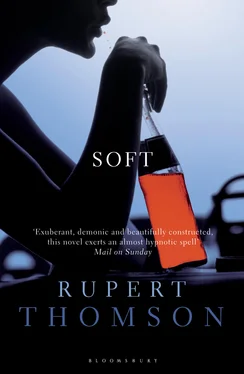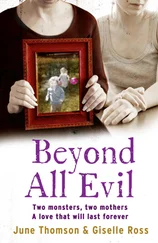One night in early April she was woken by the sound of the phone ringing in the corridor outside her room. The fire she had lit earlier had burned low. In the window she could see pale clouds floating past the rooftops of the houses opposite. She looked at the clock. 2:05. Only one person she knew would call this late. Three thousand miles away, in Miami, Tom would have just returned from work. Her heart seemed to drop inside her body and then bounce. She remembered the first time she met him, on the steps of Santa Maria della Salute, in Venice. The same feeling then. He had asked if she could take his photograph. His hands as he explained the workings of the camera. His voice. An hour later, on a vaporetto , he put an arm around her waist and kissed her. He wanted her to fly to Istanbul with him, but she was on a college field trip, studying Renaissance art, and she couldn’t just abandon it. She had such beautiful skin, he told her. Like the whiteness you find when you cut a strawberry in half. Like that special whiteness at the centre …
Out in the corridor the phone was still ringing. She pushed the bedclothes to one side and put her bare feet on the floor. Her throat tightened. It was always the same with Tom. When she first answered the phone, she hardly knew what to say; though she loved him, he felt like a stranger to her. ‘Jesus, Glade,’ he would say, ‘your voice is so fucking small .’ But he would talk, he was good at talking, and gradually it came back to her: the shape of his head, the smell of his skin. He would be lounging on a sofa, the top two buttons of his shirt undone, his tie askew. He’d be drinking bourbon (sometimes she could hear the ice-cubes shifting in his glass). She could see the apartment, with its windows open, a thin cane of sunlight leaning against the wall, as if some elegant old man was visiting. Outside, the ocean had a metallic finish to it, less like water than the paintwork on a car, and the palm trees showed black against the soft mauve glow of the sky. She found pockets of memory inside her, which she could reach into, and then her voice grew in size and she could tell him about her life and make him laugh. They would talk for an hour, often more, even though it was night where she was, and she was sitting on the floor, no lights on, her back against the cold wall of the corridor. She could never bring the phone-calls to an end; when something only happens rarely, you have to make it last. But the beginning, that was always difficult for her.
This time he said he couldn’t talk for long. He told her that he had been invited to a wedding in New Orleans, and that he wanted her to come. It was at the end of the month. Would she be free?
‘Yes,’ she said. ‘I think so.’
She smiled, thinking of the difference in the way they lived. His life resembled a car-park that was full, and people drove round and round it, looking for a place. Her life, you could park almost anywhere. Sitting in the dark, she saw vast areas of empty asphalt stretching away in all directions. The white lines that would usually separate one car from the next seemed hopelessly optimistic, comical, even cruel, and above the entrance, in green neon, you could always see the same word: SPACES.
But Tom was saying something about five hundred people, and she realised she hadn’t been listening; she’d been too busy imagining his life, and how it must say FULL outside, in red.
‘You got something to wear, Glade?’
‘I think so.’
‘One of those crazy dresses.’ He laughed. ‘You’re sure? You don’t want me to wire you some money?’
‘No. I’ll be all right.’
After she had put the phone down, she stayed sitting on the floor and shook her head. ‘Damn,’ she whispered. Now she thought about it, she was pretty sure she didn’t have a dress she could wear to the wedding — and she didn’t have the money to buy one either: all the bills had come that month and Sally, who was broke, had asked Glade to pay her share for her. A wedding. In New Orleans. She walked back into her bedroom and turned on the light. Her eyes hurt in the sudden yellow glare. Opening her wardrobe, she began to look through her clothes. After five minutes she stood back.
Stupid, stupid.
But he was always so fast on the phone, his life happening at a different speed to hers. She thought of the photograph she had taken of him, standing on the steps of that white church in Venice. When he showed her the picture some weeks later, she was struck by how confident he looked, how easy. It was hard to believe that the person behind the camera was not a close friend of his, or a lover — and yet, at that point, they had known each other for less than a minute. He seemed ahead of where he should be, even then; he seemed to be operating on a different time-scale, somehow.
She closed the wardrobe and switched off the light. The darkness was printed with the shapes and colours of dresses that were no use to her. She crossed the floorboards and climbed back into bed. The sheets were still warm. She lay down, but her mind wouldn’t rest. In the distance she heard a man shouting and felt he was doing it on her behalf, his bellowing strangely monotonous, with gaps in it, like some kind of Morse code signalling despair.
‘What am I going to do?’ she said out loud.
Her white cat stretched and settled against her hip.
That weekend Charlie came to stay. He appeared at four o’clock on Saturday afternoon with six cans of lager in his hand and a copy of the Evening Standard wedged under his arm. He had grown his hair since Glade last saw him and it hung in a thick plait down the centre of his back, exactly where his spine would be. He was wearing a grey-blue RAF greatcoat and a pair of motor-cycle boots. When she hugged him, she could smell mothballs and tobacco and the raw spring air. Upstairs, in her bedroom, she had lit a fire to welcome him. While she stooped to add another log, he told her about the London plague pits, whose sites he’d been visiting. The breadth of Charlie’s knowledge seldom failed to astonish her. You could ask him about Karl Marx or phone-tapping, any subject at all, and he would talk for fifteen minutes, his voice even, almost monotonous, a roll-up in his slightly shaky hand. Though Glade would listen carefully to what he said, she didn’t often remember much about it afterwards. Still, it was a comfort to know these things could be understood.
She didn’t usually drink beer. That afternoon, though, its metallic flavour suited her; she thought it tasted as if it had come from somewhere deep below the surface of the earth, as if it had been mined rather than brewed. By seven o’clock they had run out. They decided to go to the off-licence on North Pole Road and buy some more. On the way she mentioned that Tom had called. Charlie liked listening to stories about Tom. His favourite was the one about her ear. Once, in a bar in San Francisco, Tom had leaned across the table and said, quite seriously, ‘You know, Glade, you could get that ear fixed.’ The first time she told Charlie the story, he didn’t say anything, which unnerved her. Turning the right side of her head towards him, she had lifted her hair and showed him her sticking-out right ear. ‘Do you think I should get it fixed, Charlie?’ By then he was laughing, though, and opening his tin of Old Holborn so he could roll himself a cigarette. In any case, it wasn’t the kind of question he would think of answering.
As they walked back to the flat, carrying a new six-pack of lager and three bags of crisps, Glade explained her predicament: a wedding in New Orleans, no money for a dress.
‘Didn’t he offer to buy you one?’ Charlie asked.
‘Yes. But I told him I had something.’ She saw the look on Charlie’s face. ‘Well, I thought I had.’
Читать дальше












